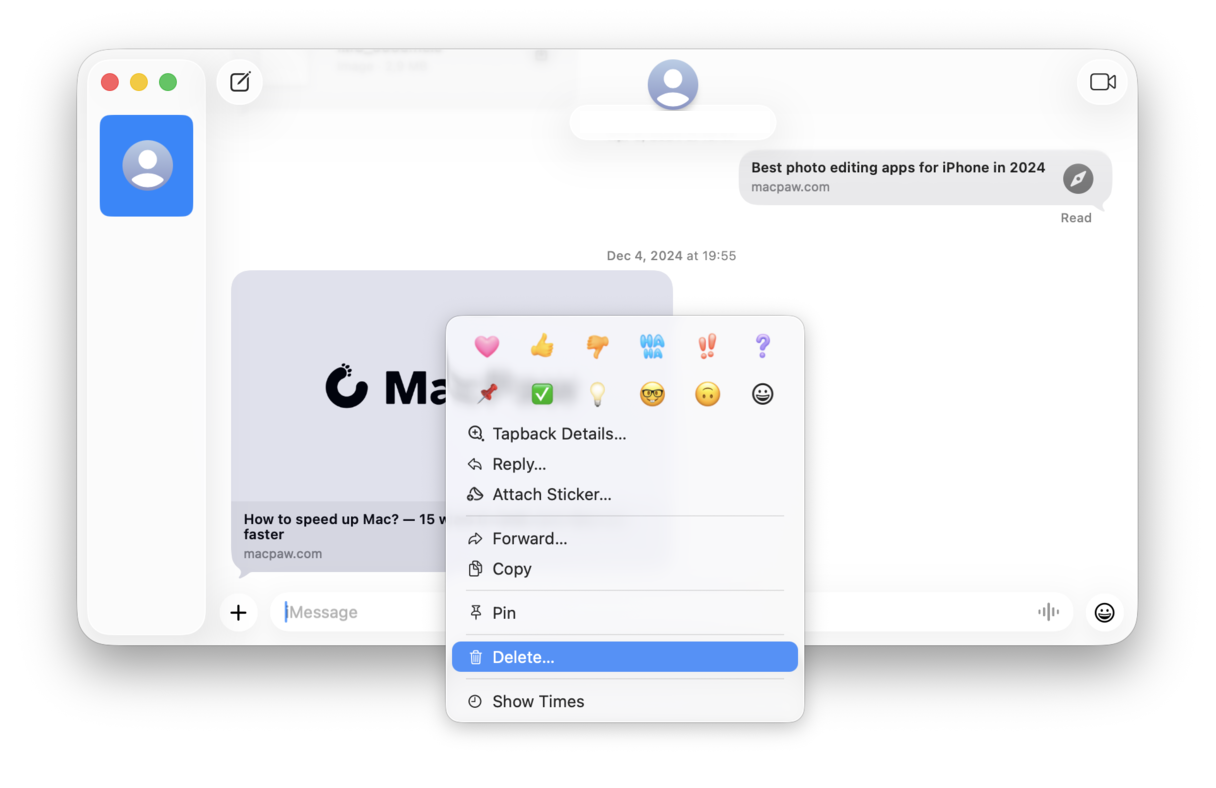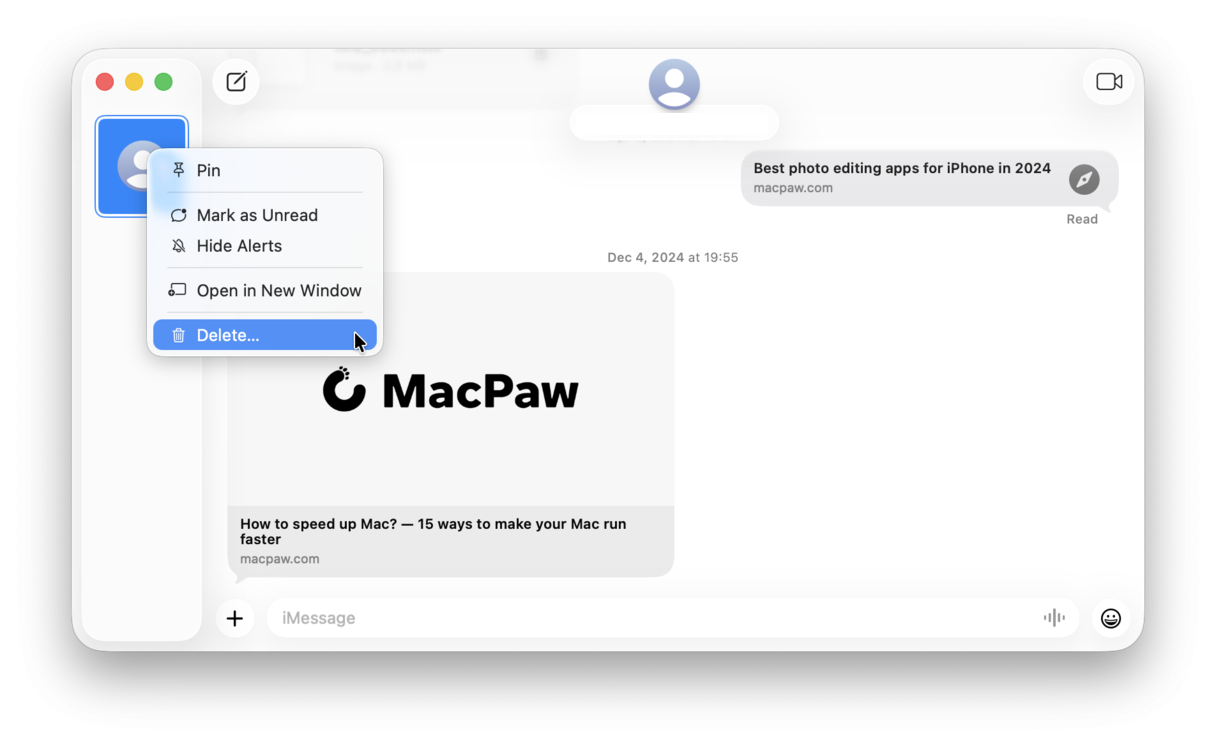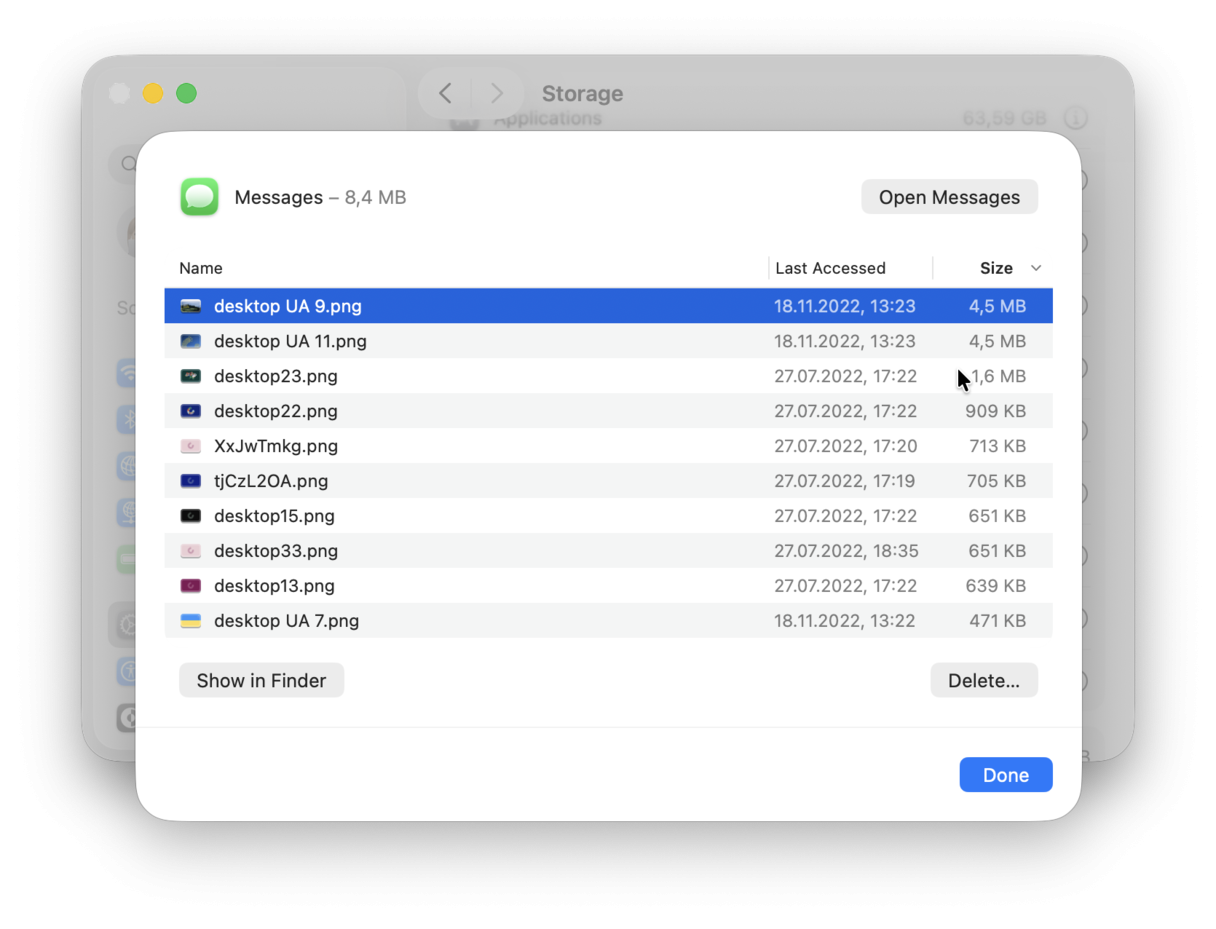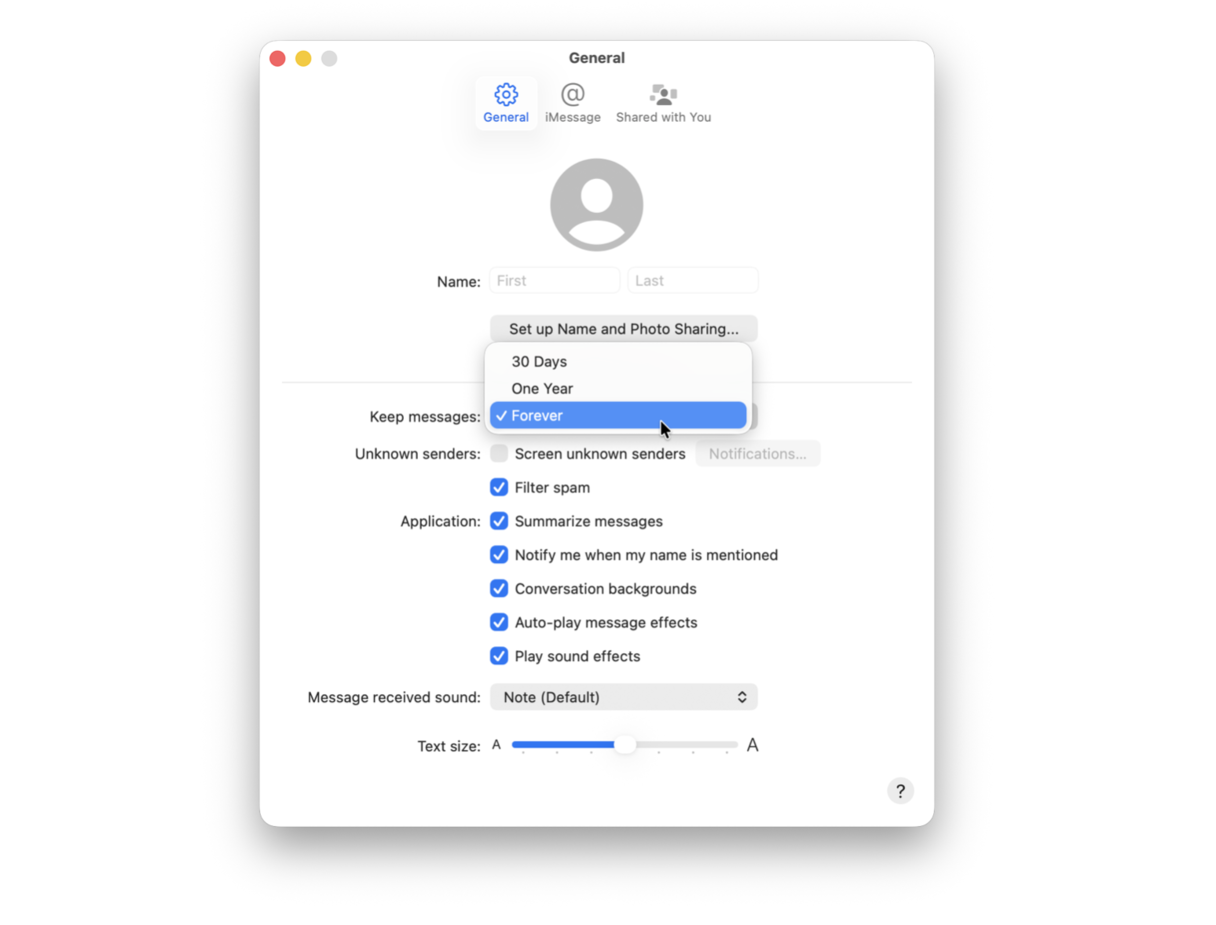Messages taking up space on Mac? Try this
Ever wonder what’s secretly eating up your Mac’s storage? It might just be your Messages.
Yep, those seemingly innocent group chats, memes, and video clips are quietly piling up, taking up gigabytes of your precious disk space. Before you know it, your storage is full, and things start to slow down.
We’ll break down why this happens and show you how to fix it. Keep reading to learn how to free up space, keep your Messages in check, and get your Mac running like new.
Why are Messages taking up so much storage on Mac?
Messages can be taking up too much space because of attachments, accumulated app cache, and long conversation threads or chat history.
When was the last time you reviewed and deleted your messages? It's not something most users do every day, and it's for that main reason why Mac Messages are taking up space.
Now that we know what stands behind the issue, let's get started with tips to help you reclaim storage space.
How to delete messages on Mac to free up space
There are a couple of ways to handle storage issues caused by your Mac's Messages app: delete individual messages and attachments, delete entire conversations, or use the Reduce Clutter feature.
1. Delete individual messages and attachments
If you've got years and years' worth of messages and conversations, then deleting them individually isn't going to be a quick task, but it does work to reduce the space consumed by attachments. Here's how:
- Open up Messages on your Mac.
- Select the conversation from which you want to delete messages.
- Right-click the attachment you want to remove.
- Click Delete and confirm.

Repeat until you're been through all of your conversations.
Tip: You can also go to ~/Library/Messages/Attachments using Go > Go to Folder in the Finder and remove attachments from there, but this way, you do not see right away what you are deleting; instead, you will have to open each subfolder to double-check if you aren't removing anything important.
2. Delete entire conversations
If you're not precious about saving conversations, then a quick way to free up space is to just delete entire conversations; here's how:
- In the Messages app, right-click the conversation you want to delete from the sidebar.
- Select Delete Conversation and confirm your choice.

3. Use the Reduce Clutter feature
You can free up some space taken by Messages using the built-in tools found in System Settings. Here's what to do:
- Open up your Mac's System Settings from the Apple menu.
- Click General > Storage.
- Select Messages in the list; this will open up a menu that lists all your media; select and delete the ones you no longer need.

Tip: If you think you might need any of the images later in the future, make sure to first save them somewhere on your Mac — in a folder or in the Photos app.
A tip to prevent this kind of build from happening again in the future is to turn on the Automatically Delete Old Messages feature; here's how:
- Open your Messages app.
- Select the main Messages menu > Settings > General.
- Under the Keep Messages menu, choose your time preference from Forever, One Year, or 30 days.

These tips should help you stop Mac Messages from taking up space, but it's not the only thing you can do to keep your MacBook running smoothly.
How to free up space in other ways
Besides managing your Messages, there are a few other effective methods to free up space on your Mac: remove system junk, clear downloaded files, use built-in storage optimizer, and move files to external storage. Just follow the tips below one by one.
1. Remove your system junk
Items like temporary files, cache files, and leftover data from uninstalled apps can also consume lots of space on your device, and so removing them will help you reclaim gigabytes of storage?
Instead of wasting hours manually removing these items, use a dedicated Mac Cleaner, like the Apple notarized tool, CleanMyMac, for quick, instant results; here's how to use it:
- Once you've installed the app, open it up (get your free trial here).
- Select Cleanup > Scan.
- Once complete, simply click Clean or tap Review to check the accumulated files before deletion.

The benefits of using CleanMyMac:
- Cleans over 81K Macs daily
- On average, users detect and remove 10.5 GB of junk files after the first scan
- Not only does it clear out junk, but it also removes malware, duplicates, and similar images: on average, users get rid of 1 malware, 4 duplicates, and 5 similar images after the first scan
Try CleanMyMac for free — see how much junk is secretly eating up your space and test out other features, too.
2. Clear your downloaded files
Another quick way to claw back space is to clear out all your old, downloaded files that you no longer need. Here's how:
- Open your Downloads folder.
- Search through your items and delete files that are no longer necessary.
- Empty your Trash once you're finished.
3. Utilize Apple's Storage Management tool
You can use Apple's built-in Storage Management tool to turn on Mac-specific storage optimization recommendations.
- Go to your main Apple Menu > System Settings > General > Storage,
- Under Recommendations, see which optimizations are available to you and enable the ones you want.
- Next, you can also review large files by applications
- Click each specific app to see which files are available for review and deletion.

4. Move your files to external storage or cloud services
Another effective way to free up space on your Mac quickly is to move your files and folders to an external storage device or a cloud storage service. Both options have their advantages:
- External Storage Devices: Portable hard drives and USB flash drives offer a reliable way to store large files and backups, freeing up space on your Mac's internal drive.
- Cloud Storage Services: Services like iCloud, Google Drive, and Dropbox allow you to access your files from anywhere and keep your Mac less cluttered.
By utilizing these storage solutions, you can keep your Mac running smoothly and avoid unnecessary storage issues.
Tip: If you choose to move your files to a cloud storage, make sure that it is always clutter-free. The easiest way to do it is to use CleanMyMac and its Cloud Cleanup feature. Once you connect your cloud account — iCloud, Google Drive, Dropbox, or OneDrive — you can scan it and reveal the largest space hoggers. You can then remove unneeded stuff with a click and reclaim gigabytes of space. Try CleanMyMac for free.
Managing the storage on your Mac, especially when it comes to the Messages app, is essential for maintaining optimal performance and ensuring you have enough space for your files and applications. All of the tips we've shown you in this article will help you deal with Messages taking up too much space on Mac.
FAQs: iMessage is taking up space on Mac
How can I check how much space I have on my Mac?
Here's a quick reminder for those who need it on where to see your system storage overview: from your Apple menu, go to System Settings > General > Storage.
How often should I review my Messages?
This really depends on your usage, how many group messages you're in, and how much media you're sending and receiving. Setting your messages to delete after 30 days will definitely help to take away some of the manual upkeep.
How to delete Messages cache from Mac?
Open a new Finder window, press Command + Shift + G, and paste this path followed by Return: ~/Library/Messages. Now, look for the Caches folder and delete the contents of subfolders. Empty Trash, and the Messages cache is gone. You can also return to the main Messages folder and repeat the process for other folders with caches in their name (like CollaborationNoticeCache or StickerCache).
Why are my iCloud messages taking up storage on my Mac if they're in the cloud?
Even if your messages are in the cloud, they will still take up space on Mac because attachments are downloaded locally if you open them on your computer. Attachments can be stored on your MacBook even after you delete them or messages — hidden in the Library folder.
Will deleting messages on my Mac also delete them from my iPhone?
Yes, if iCloud syncing is enabled, messages/conversations will be deleted from all accounts signed into the same Apple Account and set up to sync messages. However, in some cases, this deletion is inconsistent, and so some messages may still be left on your iPhone even after you delete them from your Mac.

